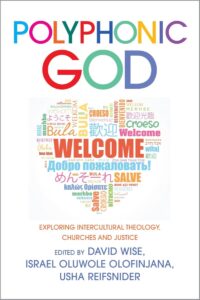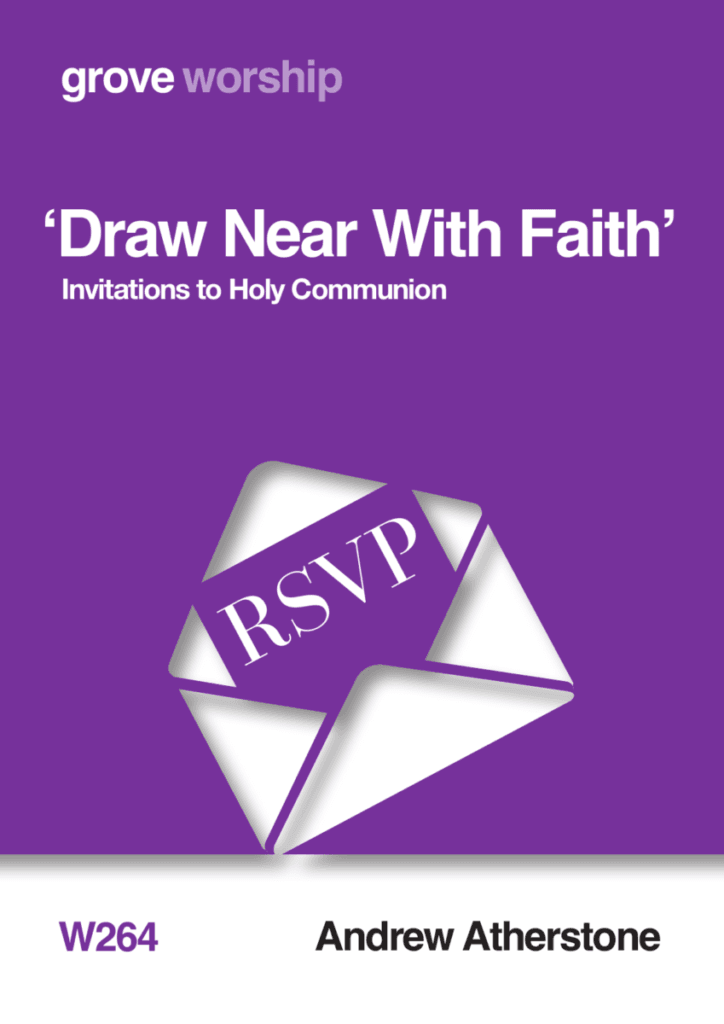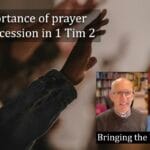John Root writes on: Polyphonic God: Exploring Intercultural Theology, Churches and Justice, edited by Israel Oluwole Olofinjana, David Wise, and Usha Reifsnider.
This book is a goldmine. Several of the contributions are brilliant; none is without merit. Church leaders in multi-ethnic communities will find the book invaluable, despite its fairly hefty price.
Contributions come from a very wide range. There are fifteen chapters by sixteen different authors (including two married couples) from Nigerian, Latin American, Korean, Chinese, Caribbean, Tamil, Gujerati and white British backgrounds. Their experiences are geographically varied—London, Manchester, Derby, Glasgow, Belfast and Cardiff—so (deliberately?) all four parts of the UK. Denominationally they are mostly independent/charismatic. On my count there were only three Anglicans, none of them directly describing congregational life, indicating that despite many words at senior level, on the ground we have far less innovation. Jessie Tang, explorating her identity as British Chinese, is perhaps the only author who could be called young.
All in all, ministers in multi-ethnic areas will have the bracing and exhilarating opportunity to read about understandings, situations and initiatives that connect with and may often illuminate or challenge their own experiences. The editors deserve our thanks for gathering such a comprehensive range of contributors/
Highlighted contributions
‘The Metaphor of Tapestry: A Theological Framing for Inter-ethnic Congregations’, by David Wise.
Inspired by Colossians 2:2 (The Message) ‘I want you to be woven into a tapestry of love’, plus Ephesians 2:10 on being God’s workmanship, Wise developed the metaphor of the church being God’s tapestry to form the life of Greenford Baptist Church. It served as a powerful guide for the whole congregation to see how their life together should be shaped, recognising the need to counter the ‘diseased social imagination’ of white superiority that the American theologian Willie James Jennings has depicted. Not only do a wide variety of colours have their place, but even the smallest addition of a colour enriches the whole. For me, it emphasised the importance of churches having a clear and fertile metaphor to guide their life.
‘You are Home! The Family Metaphor and Its Impact on Understanding Church and Intercultural Communities in Ephesians’, by Oscar Jimenez.
Essentially this is a thoughtful exegesis of Ephesians, the letter’s message summarised as ‘In love, king Jesus has incorporated believers into the Father’s household as beloved children’; going on to an astute, well-grounded contrast of the easily assumed ‘Church as Business’ model over against what it means to live out ‘Church as Family’, meaning to ‘see one another first as siblings in Christ, rather than as representatives of different cultural backgrounds’ (p 66). Simply as an account of the theology of Ephesians it stands well on its own. One can speculate on whether the author’s Latin American cultural background gives a richness beyond that of a writer from a north Atlantic culture.
‘Re-tuning Worship: Biblical Principles for a Culturally Diverse Age’, by Ian Collinge.
By any account this is an A* article. It is clearly organised, theologically shaped, and practically very useful, giving an astonishingly far-ranging guide to the resources available to those who want to expand the cultural range of their worship, mostly but not entirely musically.
‘Feeling Welcomed and Accepted: A Case Study of Greenford Baptist Church’, by David Wise.
Wise (the only contributor of two articles) gives a description of what a ‘full fat’ intercultural church might look like: a two and a half-hour service, with an informal 25 minute ‘connection time’ in the middle; the unabashed use of ‘first languages’ in music, prayers, readings and speaking; the liberal use of dance, flags and other multi-ethnic visuals. The aim is that each culture should be confident to express itself as itself in the midst of the whole congregation. Ought this to be the goal of every church? Or how far should we be shaped by leadership capabilities (and therefore long-term continuity), available resources (especially musical), and inherited accountability to traditions?
‘Laying Form Foundations for a Healthy Intercultural Church’, by Adam and Katrina Martin.
Narratives make good reading. This is the account of a family moving into inner-city Derby and through hospitality and serving the needs of new arrivals forming an informal intercultural congregation, which then folds back into their large, mainly English sending church, raising issues of language, power and cultural difference, including the elusive issue of different cultural emphases over guilt/innocence, honour/shame and fear/power.
‘Just Leadership: Developing Racial Empathy to Break Systemic Strongholds’, by Kate Coleman.
My early suspicions of wokeness were assuaged by the spiritual and experiential richness of this article (in fact taken from her book ‘Metamorph: Transforming your Life and Leadership’). The often-used account of the Hellenic widows’ grievance over food distribution in Acts 6 here threads through the chapter with a superb richness of texture, creatively bringing it to bear on current situations. Overall, her use of New Testament passages is frequently refreshing and original. There are helpful phrases: ‘radical empathy’; ‘an understanding of the lived experience of marginalized groups’ (p 205); and ‘radical solidarity’.
It is only as we listen, read, watch, and learn that we become better equipped to use our influence to change things where needed, especially if we are senior decision-makers and members of dominant groups. Unless radical empathy finds expression in radical solidarity, it is of little use to anyone (p 212).
Discussion of Specific Issues (based on the three foci in the book’s sub-title, plus a miscellania section).
Miscellania
Most chapters have a bibliography/resources section, often running to over a page. We are guided to a life-time of further reading.
My guess is that at least half the contributors refer to Revelation 7:9. Quite right too. (See my article on this verse here).
Less commendatory are the two applications to contemporary Britain of Martin Luther King’s observation of 1960s USA that Sundays at 11am is the most segregated hour of the week. As well as being dispiriting and witness-blemishing this is simply untrue. Can people list the white-only churches in multi-ethnic areas? I haven’t known of any since the 1990s.
Theology
This is an SCM Press book that could have been published by IVP! Its overall theology is basically evangelical, at times marked by a particular richness in biblical understanding and interpretation (Jimenez and Coleman). Mairi MacPherson’s fascinating account of her ‘Nations’ work with Edinburgh City Mission in the demanding and frustrating work (in my experience) in attempting to build functioning relations with diasporic or ethnically focussed congregations notes ‘that we seek to promote Christianity in the midst of theological diversity’ (p 141) but there is no contribution from a prosperity or hyper-supernatural church background in the book.
At the other end of the theological scale, Sharon Prentis rightly notes that ‘Contextual theologies emerged in response to the marginalisation of certain voices from mainstream theological discourse’ (p 218), but there is no call for a radical re-ordering of the political world that has marked the more liberal versions of contextual theology (see further on ‘Racial Justice’ below).
The most theologically exploratory chapter is the final one: Usha Reifsnider on ‘Antiracist Mission in Postcolonial Britain’, exploring the weight and meaning of the three terms in her title, but to me it read as a condensed version of a thoughtful and provocative thesis which needs more space for full exposition.
Church
This is essentially a practitioners’ book. Time and again readers will find it connecting with real-life issues encountered in ministry in multi-ethnic areas. In this respect I find abstract the distinctions between ‘multicultural’ and ‘intercultural’ that run through the book unhelpful. Too often it is setting up straw man definitions that are then easily knocked down. Rather, we are all working at the many and varied ways that ‘out of the many’ peoples in our area we live as ‘one people’ in Jesus Christ. Several authors speak of the need to learn from mistakes, to adapt, to improvise—all of which mean that handed down definitions of multi/intercultural are external constraints rather than invitations to explore.
Instead, we all face questions of how particular ‘peoplehood’ should be expressed in the one church. Greenford Baptist Church aims for ‘difference to be experienced in the context of unity’(p 45) so that all the ‘peoplehoods’ are freely expressed in the one assembly, but as MiJa Wi notes in ‘Intercultural Church as a Direction of Travel: Exploring the Journey of a Korean Diaspora Church (KDC)’ minorities can feel the need for security in meeting primarily with their own people. MiJa also bravely enters the forbidden ground of discussing the allure of the Homogenous Unit Principle in facilitating church growth. It is a tension that Dominic and Catherine De Souza recognise:
While there is value in homogenous gatherings, it is also important to nurture cross-cultural relationships beyond the usual silos of culture and ethnicity (p 259).
The constraints arising from sympathy with people’s felt need to worship in the familiar context of their own culture can be extended in other directions. Not only older people but also those carrying heavy everyday responsibilities can need the spiritual nourishment of a familiar worshipping routine, including in my experience people from overseas with traditional Anglican backgrounds. Several contributors refer to the need for ‘risk-taking’ but such assessments need to bear in mind our solemn responsibility for caring for peoples’ souls. Can the need of the ‘weak’ (Romans 14:1) be damaged by our exciting innovations.
To push the question further, if it is acceptable to exercise restraint in accepting that ethnic minorities can validly worship within their own culture, then what place can there be for expressing the culture of disadvantaged, educationally and economically struggling English people? Are they too at present a ‘muted’ voice that is not being heard in the conversation about expressing diversity in worship and church life? (See my article ‘Ethnicity and Asymmetry’).
Racial Justice
One blessing of the book for me was to rehabilitate the concept of ‘racial justice’. Too often, both in Church of England leadership and national debate, it is seen in bureaucratic terms, thus statistical ethnic proportionality in the choice of significant figures, or in terms of reparations, or in the removal of objects found to be offensive. Dominic and Catherine De Souza argue that ‘The church has a vital role to play in advocating for broader social change’ (p 261), but clear-cut examples and narratives are absent from the book. This might properly be because, particularly since the Sewell Report, the nature and extent of structural or institutional racism is contested. Given the success of very ‘traditional’ approaches to the education of ethnic minorities, such as the Michaela Academy in Wembley, what does ‘racially just’ education look like? Given the major impact on life chances of growing in a stable two-parent family, ought not the advocacy of national ‘marriage friendly’ policies be a strong element in social justice advocacy?
Rather, in the book contributors in various ways emphasised the positive ways that intercultural churches further racial justice through providing genuine encounters, not merely by being in the same place at the same time, but by a process of listening (frequently emphasised), sharing stories and being changed by the encounter—‘a conscious effort to engage with another to create interdependence’ in Sharon Prentis’s words (p 230). Though it would also have been helpful for attention to be given to the negative—how and when should implicit racism be encountered and possibly rebuked in those who feel they are free of it. Looking back on my own ministry it is the lack of effectiveness in addressing such attitudes that challenges me most.
Kate Coleman’s article is particularly helpful in delineating the sort of spirituality that generates racial justice. White Christians ‘will need to get used to make a conscious effort to engage with perspectives outside their own racial experiences’ (p 206). Her use of the crucial word ‘immersed’ points to what is a crucial lack in the experience of Anglican leadership.
 The book helpfully illuminates ‘racial experiences’ such as the unsettlement experienced by Nathaniel Jennings in his chapter ‘The New Northern Irish’ as racist rioting underlined his precarity (and determination to stay and work). Since he wrote both in Northern Ireland and now across Britain the vulnerability of minorities to racial hostility has been underlined.
The book helpfully illuminates ‘racial experiences’ such as the unsettlement experienced by Nathaniel Jennings in his chapter ‘The New Northern Irish’ as racist rioting underlined his precarity (and determination to stay and work). Since he wrote both in Northern Ireland and now across Britain the vulnerability of minorities to racial hostility has been underlined.
And therefore we see the importance of the maturing of intercultural churches to be beacons of the love, life and light of God in a fragmented world.
I don’t relish reviews that burden me with a sense that here is yet one more book that I really ought to read, but here is a book that you really ought to read. I think it is of enormous value to any church leader in a multi-ethnic community (now virtually all of England).
 John Root was a curate in Harlesden, led an estate church plant in Hackney, and planted two Asian language congregations in Wembley, before enjoying retirement ministry in Tottenham.
John Root was a curate in Harlesden, led an estate church plant in Hackney, and planted two Asian language congregations in Wembley, before enjoying retirement ministry in Tottenham.
This article was first published on John Root’s substack here.

 Buy me a Coffee
Buy me a Coffee




























Thank you for publishing this inspiring review of what looks like an exciting book for church leadership. Although I appreciate his last ssentence!
Heaven will be multiethnic but not multicultural. The church of Jesus Christ should have its own culture, and that will be recognisable across cultures if it sticks to the principle of sola scriptura. Minority people groups in a church should be actively asked if they think any aspect of church reflects the prevailing culture, goes beyond the New Testament, and is objectionable to them, and the reply taken seriously. Services should not be multilingual, however, and one should choose a congregation accordingly.
Do you not believe that there are distinct elements of different cultures which could continue into the eschaton?
I do – that is why I added “and are objectionable to them”. But do remember that all human culture is fallen. The music in heaven will be greater than Bach or Mozart.
Greater than Bach? Heretic.
At least there will be nothing by Marty Haugen or Sydney Carter.
Greater than their bite…
I’m not sure there is such a thing as ‘greater’ in music. The enjoyment of music is very individualistic. After a few bars of most classical music I become bored. Hopefully there will be rock and pop in the next life!
Why don’t you think services should be multilingual?
It is a thing plainly repugnant to the Word of God, and the custom of the Primitive Church to have Publick Prayer in the Church, or to minister the Sacraments in a tongue not understanded of the people (Article XXIV).
Anthony, could that be a reason to have services that are multilingual? 🙂
Yes at an occasional international gathering of Christians but not at regular public worship in the local setting where disruption to people’s train of thought is exactly what you want to avoid.
Not multilingual services but language-specific services for migrant communities have always been the way. Farsi and Cantonese services are well known in Britain.
Encouraging people to pray the Lord’s Prayer in their own tongue and some prayers in Cantonese and Tagalog is how Sydney Anglican Cathedral handles special occasions like Seafarers Sunday.
Catholicism got round the problem for centuries by having the mass in Latin, which Pope Francis tried to stamp out – a little strange to inhibit the most devout Catholics, it seems to me. A great shame too few people know Latin today.
Interesting responses :-). Don, would everyone saying the Confession or the Lord’s Prayer in the language they know best really disrupt *their* ‘train of thought’ in a local setting? Or even monolingual English speakers learning a few songs in those languages as a sign of our unity in diversity?
James, why only ‘special occasions’ in Sydney Anglican Cathedral? And from your last paragraph, isn’t it encouraging rather than ‘strange’ that Francis followed Article XXIV?
Doesn’t translation deal with that?
I’m quite fond of having some sections of a service using Latin (e.g. the Agnus Dei), but I’d always want to have the English translation with it.
Apologies Ian – force of habit!
Perhaps we’ll all speak in tongues…. (And great article)
For this general area, western Christians in particular should read Lamin Sanneh.
One point he makes is the difference between the two great proselytising religions. Islam would bring everyone into a similar culture. Classical Arabic is the Holy Language etc. In contrast,
Christianity takes its message into different cultures and embraces that which is good, but different from others. This is a reflection of the great truth of Christianity that God himself came to us and dwelt among us in the incarnate Word. In Africa, the great explosion of Christianity was not brought about by Western missionaries, but it is largely an African thing. The West has helped by Bible translation work. Having the written Word in one’s heart language makes very real the coming of the Eternal Word.
Those gathered for the festival of pentecost probably all understood Greek, but the Spirit enabled each one to hear “the mighty works of God” in their heart language. I suspect that the great multitude from every tribe and language and people and nation will retain the diversity of language and other ‘cultural’ characteristics.
For does not our God delight in diversity?
It seems from the
Sola scriptura is more a restriction on what is required for salvation than restricting what is permitted. I am glad that I am not required to assent to the doctrine of the bodily assumtion of Mary, as discussed in this place recently.
A discussion arose in the first churches mirroring that in western society today about ‘white privilege’, except the issue then was ‘Jewish privilege’. The question was settled by Paul, much of whose writing is concerned to hold Jew and gentile together in the church. He told the Galatians (3:28) that in Christ there is neither Jew nor Greek.
ANTHONY
Thanks for your sensible comments.
‘… the need to counter “the diseased social imagination” of white superiority” (Wilie James Jennings). The left really has it in for white people, doesn’t it? BLM rhetoric is not only tiresome, it is largely detached from reality. I wonder how much time that author has spent anong Arab or Chinese or Pakistani communities, each convinced of its superiority.
American public life in recent years has been poisoned by racial antagonisms, and this after the messianism of Obama’s presidency, which was supposed to usher in a glorious post-racial future. In reality it did nothing of the sort because Obama demagogued racial issues. The reality is that American black family life is in a terrible state (80% of black children in Chicago are being brought up by single mothers), a situation that would be unthinkable among other ethnic minorities. Yet the black church seems powerless to address this huge failing. Fatherless boys is the real root of the problem.
I hope we’re not seeing here a Christian attempt to fall in behind the wretched dogma of multiculturalism. Surely by now people have come to see that it doesn’t work. And a closer look reveals its connection with the global influencers who now have a serious grip on the Western world – hence the encouragement of both legal and illegal mass migration across national borders which we now see. There are even attempts to con the gullible into believing it’s all happening as a result of ‘climate change’! And we can see the blatant actions here in the UK to clamp down on the free speech of anyone who dares to voice concern about the social disruption involved.
In contrast, true Christianity rejoices in the diversity of God’s creation which most certainly extends to the human race and how people live in the varying circumstances of physical and economic geography around the world. But Christians shouldn’t fall for the atheistic, totalitarian inspired, social engineering which actually intends social disruption as a reason to manipulate people into demanding the kind of authoritarian governments which will return their lives to ‘safety’ and good order from the social and economic chaos they’re experiencing.
Once again we need to remind ourselves that Christ brings peace for the human heart, but a sword between those who accept him and those who seek another ideology or perhaps not to think at all about such things. We Christians should beware falling for any dogma or ideology which presents itself as a way to make everyone feel better while bypassing the true but hard aspects of the gospel. Such an approach can only end in alienation from God and consequent misery – and that’s not the way of love.
Not forgetting the dry run for centralised social control which was the covid coercion, in which any questioning was vociferously denounced – a sure hallmark of totalitarianism. The Christian Church is under massive atack in China, North Korea and the Islamic world, and under great ethnic presure in India. These are the real multicultural issues for the Church, but on these the left has nothing to say because it actually agrees with these coercive forces, not least because they exemplify the power of the state to mandate its will.
Christians should rejoice in cultural diversity without becoming uncritical or forgetting that all cultures are in a state of transition and subject to sin against God. In leftist American circles, for example, responding to the great growth in America’s Hispanic culture, there has even been an attempt to excuse human sacrifice in Aztec and Incan history, knowing of course that this is an Achilles’ heel in the new narrative of a mythical Rousseauian past.
‘Not forgetting the dry run for…’
Yes indeed but how far off topic dare we go without a strike?!
As it happens, I despair about the sheer lack of awareness or apparent concern there is among Christians about the global fascism into which our Western democracies (notably the UK) are rapidly descending. But shouldn’t we Christians concentrate on the gospel whereupon society will be transformed and awakened to the evil which is capturing it?
I would say ‘no’ if only for this reason: we citizens (including Christians) in a democracy are collectively the ruling sovereign authority (not parliament which is only loaned decision making powers by voters on a temporary and limited basis). Whether we like it or not this lays on us the duty to ensure our politicians are behaving wisely, justly and free from corruption. For Christians to opt out from this duty is to negate the responsibility of a leader, under God, to rule as He would wish. Being born into a democracy is a gift (from God) which we in the UK inherited but haven’t done our bit to preserve. Quite apart from that, Christians must surely have concern for how their fellow citizens are being treated and be warning them of impending disaster.
So I believe there’s a serious collective failure in terms of prophesy to the nation regarding all of this; we are not paying attention to the Biblical examples (successes and failures) on this matter. It requires, for example, that we make ourselves aware of the real truth of what’s happening rather than accept the trash spewed out by the mainstream media (although omission vies with falsity as their main weapon!) In particular it’s a serious failure when Christians resort to the mocking words of “conspiracy theory” about others when they themselves are too lazy or too fearful to confront the dark realities of what’s happening; Proverbs 14:6 is clear about that attitude. None of it is comfortable, least of all when we consider what our children may be facing.